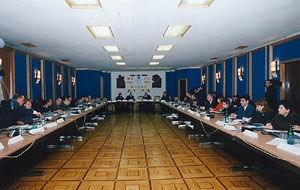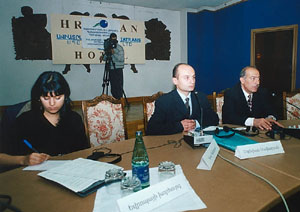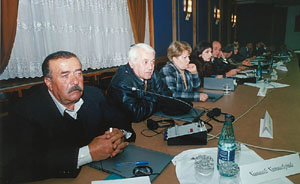| |
November 27, 2003
ACNIS Policy Seminar on Religious Issues of National Minorities
Yerevan—The Armenian Center for National and International
Studies (ACNIS) today hosted a third policy seminar here in its ongoing
series on national minorities. Dedicated this time to “The Religious
Issues of National Minorities in the Armenian Reality” and held within
the framework of a Council of Europe project on “Coordination among
National Minorities and Information Exchanges on Minority Rights in
Armenia,” the conference brought together the representatives of all
national minority communities in the republic, spiritual leaders and
government authorities dealing with religious issues, diplomats, as well
as Council of Europe and OSCE specialists to focus on the most pressing
religious issues.

Karapet Kalenchian of ACNIS addressed the capacity audience
with opening remarks. “The more the nationalities and religions in
a given state, the stronger that state should be. Different religions
must become a unifying, not a divisive force. This is one of the bases
of democracy. To have a developed democracy we should combine all our
efforts,” he said.
Stepan Safarian, ACNIS project director, noted that “the
religious issues of national minorities in Armenia cannot be viewed
within the context of discrimination, as there exist no records certifying
any case of persecution towards national minority representatives because
of their religious belief. Nonetheless, national minorities do
have multiple issues to be considered collectively.”

Arsen Mikhailov, chairman of the “Atur” Assyrian union,
gave a report on “Matters of Creed in the Assyrian Communities.”
“The Assyrian Apostolic Church of the East is already operating in
Armenia, registered here with the support of the Armenian government.
The major problem we face is the repair of churches, which we cannot
solve for lack of finances,” he stated.
Hasan Hasanian, head of the Yezidi religious organization
“Followers of Sharfadin,” dwelt upon “The ‘Sharfadin’ Creed: Religious
Questions in the Yezidi Communities” without recording any case of discrimination
in Armenia. The Yezidis, he asserted, encounter no obstacles in practicing
their religion; however, society is unaware of their traditions, ceremonies,
and so forth. “It is desirable that television cover and make the public
aware of our national traditions, and students be taught about the religions
of national minorities in their school curriculum,” he said.
Rima Varzhapetian, chairwoman of the Jewish community
of Armenia, mentioned in her paper that Armenia is one of the most
favorable countries where national minorities bear no discrimination
or persecution. Still, she wished for the government to be more sympathetic
and caring towards the challenges their communities face.
Slava Rafaelidis, chairman of the Council of Armenian Nationalities,
informed his colleagues that the Greek community had applied to the
Yerevan City Council several years ago for a place to build a Greek
church. The City Council allocated a place for it, but after a period
of time it changed its decision, and the Greek community could not afford
building a church with its own resources.
Father Garegin Haroutiunian, dean of the Vazgenian Theological
Seminary at Sevan, addressed “The Potential for Harmonious Coexistence
among Different Ethnic Religions in the Armenian Reality: The Perspective
of the Armenian Apostolic Church.” “The Armenian Apostolic Church
carries no prejudice toward any other branch of Christianity or any
other religion,&#`48; he said.
Razmik Markosian, religious affairs adviser to the Armenian
Prime Minister, spoke about “The State’s Approach to the Religious
Problems of National Minorities.” According to him, the problems of this
and other spheres are also due to the absence of consensus among the communities.
“Today’s session of government will discuss the creation of a board on
national minority issues,” he stated.
Vardan Astsatrian, the coordinator on national minorities
and religious issues of the social department of the Armenian government,
continued the theme of the state’s approach to the religious issues
of national minorities. He was certain that all relevant problems could
be overcome through regular joint efforts.
During their discussions on creed and religious identity,
virtually all the participants in the seminar expressed concern about
sectarian movements and proselytism which threatened both the Armenian
majority and the national minorities.

The formal deliberations were followed by questions,
answers, and a lively exchange among Siaband Bakoyan, chairman of the
“Ezdikhana” association’s political council; Alikhan Shababian, representative
of Nor Nork district council; Rima Varzhapetian, chairwoman of the
Jewish community of Armenia; Knyaz Hasanov, representative of the Kurdish
community in Armenia; Slava Rafaelidis, chairman of the Council
of Armenian Nationalities; Nelli Simonidi, Greek-Armenian school teacher;
Arsen Mikhailov, chairman of the “Atur” Assyrian union; Irina Gasparian,
representative of the Assyrian community; Alexander Yaskorski, head
of the German community; Olha Parkhomenko, head of the Ukrainian Association;
Razmik Markosian, religious affairs adviser to the Armenian Prime Minister;
Vardan Astsatrian, coordinator on national minorities and religious
issues of the social department of the Armenian government; parliamentarian
Vazgen Khachikian; Aramazd Zakarian, political council member of the “Republic”
Party; Karapet Kalenchian of ACNIS; Stepan Safarian, ACNIS program director;
Shavarsh Khachatrian, researcher at Newcastle University in the United
Kingdom; Gayane Markosian of the “Harmonious World” NGO; Tamara Vardanian,
representative of the “Noravank” foundation; Karen Toumanian of the Helsinki
Citizens’ Assembly of Vanadzor; and many others.
Founded in 1994 by Armenia’s first
Minister of Foreign Affairs Raffi K. Hovannisian, and supported
by the Lincy Foundation and a global network of contributors,
ACNIS serves as a link between innovative scholarship and the public
policy challenges facing Armenia and the Armenian people in the post-Soviet
world. It also aspires to be a catalyst for creative,
strategic thinking and a wider understanding of the new
global environment. In 2003, the Center focuses primarily on public
outreach, civic education, and applied research on critical domestic
and foreign policy issues for the state and the nation.
For further information on the Center and its activities,
call (37410) 52-87-80 or 27-48-18; fax (37410)
52-48-46; e-mail root@acnis.am or info@acnis.am
|
|





